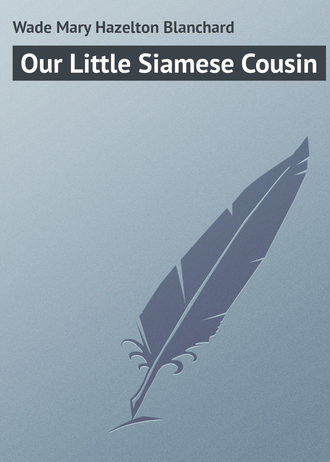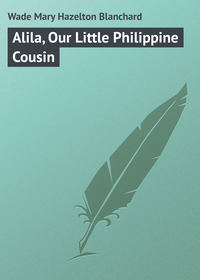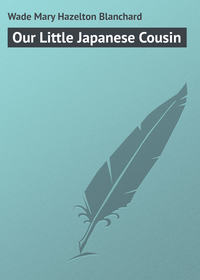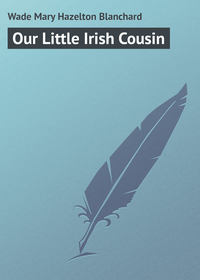 полная версия
полная версияOur Little Siamese Cousin
The children now turned their eyes toward the small boat of a Chinaman who was calling aloud to the passers-by:
"Come here and buy chouchou; it is a fine dish, indeed."
A moment afterward he was kept so busy that he had no time to call. His canoe was fairly surrounded by other boats, for many people were eager to taste the delicious soup he served from an odd little stove in front of him.
It is hard to tell how chouchou is made. Many kinds of meat and all sorts of vegetables are boiled down to jelly and seasoned with salt and pepper. He must have had a good recipe, for every one that tasted his chouchou seemed to like it and want more.
"Listen to the music, Chie Lo," said her brother, as he turned longingly away from the chouchou seller.
It seemed more like noise than music. Two men stood on a bamboo raft causing loud, wailing sounds to come from some queer reed instruments. A third player was making the loudest noise of all. He sat in the middle of a musical wheel, as it is called. This wheel is made of metal cups of different sizes placed next each other in a circle.
It seems strange that Chin and his sister should enjoy such "music," and stranger still that the grown-up people should also like it; but they seemed to do so. Were they doing it for their own pleasure? Oh no, they had dainties to sell as well as the chouchou maker, and this was their way of attracting attention.
New sights could be seen constantly. Here were the beautifully-trimmed boats of the rich people taking a ride for pleasure after the heat of the day. There were the canoes of the poor, who were also out to enjoy the sights, for Bangkok is a city built upon the water.
The river Meinam flows through its very centre. The name of the river means "Mother of Waters," just as the name of our own Mississippi means "The Father of Waters." It is well named, for many canals reach out from it in different directions.
If a person is going to a temple to worship, if he has shopping to do, or a visit to make, he does not take a car or carriage, nor does he often walk. He steps into a boat, and after a pleasant sail or row, he finds himself at his journey's end.
"Let's go down the river before we go to bed," said Chin, who had grown tired of sitting still.
He stepped from the platform into his own little canoe and Chie Lo followed him.
The children looked very much alike. Their faces were of the same shape, their eyes were of the same colour, and the two little round heads were shaved in exactly the same way. A tuft of hair had been left on the top of each and was coiled into a knot.
When Chin grew a little older there would be a great celebration over the shaving of his tuft. It would mark his "coming of age," but that would not be for two or three years yet. He was only eleven years old now and was left to do much as he pleased.
The little canoe made its way in and out among the big boats and soon left the city behind. Tall palm-trees lined the banks of the river and waved gently in the evening breeze.
Suddenly there was a loud sound, like a big drum, in the water directly under the boat. "Tom, tom! Tom, tom!" It startled Chie Lo, and she exclaimed:
"What is it, Chin? What is it?"
"It must be a drum-fish, Chie Lo. Nothing else could make a sound like that."
"Of course, Chin. It was all so quiet, and then the sound was so sudden, I didn't think for a moment what it could be."
They had often seen this ugly-looking fish, which is never eaten by the people of their country. It is able to make a loud noise by means of a sort of bladder under its throat, and it is well called the "drum-fish."
The children still went onward, keeping time with their sculls. Suddenly the air around them blazed with countless lights, and a moment afterward the darkness seemed blacker than ever. Then, again the lights appeared, only to be lost as suddenly, while Chin and his sister held their oars and watched.
"Aren't they lovely?" said Chie Lo. "I never get tired of looking at the fireflies."
It is no wonder she thought so. The fireflies of Siam are not only very large and brilliant, but they are found in great numbers. And, strange to say, they seem fond of gathering together on certain kinds of trees only. There they send forth their light and again withdraw it at exactly the same moment. It seems as though they must be under the orders of some leader. How else do they keep together?
"I can hear the trumpeter beetle calling along the shore," said Chin, as the boat floated about. "He makes a big noise for his size, and takes his part in the song of the night. There must be hundreds of lizards singing up there among the bushes, too, and I don't know what else."
"I suppose the parrots are asleep in the tree-tops by this time, as well as the monkeys. Don't you love to go about in the woods, Chin?"
"It is almost the best fun in the world, I think. Oh, Chie Lo, I saw something the other day I didn't tell you about. You made me think of it when you spoke of the monkeys. Father and I had gone a long way up the river in the canoe to get wild bananas. We had just turned to come home when I saw a crocodile ahead of us, lying close to the shore. His wicked mouth was wide open and his eyes were glittering.
"All at once I saw what was the matter. A chain of monkeys was hanging from a tree-top above him. They were having sport with the monster. The lowest monkey would suddenly strike out with his paw and touch the crocodile's head when he was off his guard. Then the whole chain of monkeys would swing away as quick as a flash, and the crocodile would snap too late.
"Oh, he did get so angry after awhile, it made me laugh, Chie Lo. The monkeys grew bolder after awhile, and chattered more and more loudly.
"Then the crocodile began to play a game himself. He shut his eyes and pretended to be asleep. Down swung the monkeys, straight over his head. His jaws opened suddenly in time to seize the little fellow who had been teasing him. That was the last of the silly little monkey, whose brothers and sisters fled up into the tree-tops as fast as they could go. I didn't see them again, but we could hear them crying and wailing as long as we stayed near the place."
"I wish I had been there," sighed Chie Lo. "It must have made you laugh to watch the monkeys before they were caught. But they are easily scared. I shouldn't be afraid of monkeys anywhere."
Chin smiled when his sister said these words.
"If there were enough monkeys together, Chie Lo, and if they were all angry and chasing you, I don't think you would exactly enjoy it.
"Father told me of a time when he was off with a party of men in a deep forest. They caught a baby monkey, and one of the men was going to bring it home. It made the mother wild to have her child taken from her. She raised a loud cry and started after the men. Her friends and relatives joined her, crying and screaming.
"But this was not all, for every other monkey in the forest seemed to get the idea of battle. On they came by the hundreds and the thousands. Do you think those men weren't scared? They hurried along as fast as they could, stumbling over bushes and floundering in the mud. They were only too glad to reach the bank of the river, where they jumped into the canoes and paddled quickly away. The monkeys crowded on the shore and screamed at them. I wish I could have seen them."
Chin lay back and laughed as he finished the story.
"We mustn't stop to talk any more, for it is getting late," said Chie Lo. "But I love to hear you tell these stories, Chin. I hope you will remember some more to-morrow night. Now we must paddle home as fast as we can go."
CHAPTER IV.
WORK AND PLAY
The next morning the children were awakened early by the cawing of large flocks of crows. These noisy birds were leaving their resting-places in the trees near by, and starting out to search for breakfast in the fields and gardens of the country.
Chie Lo and her brother jumped out of bed, and a moment afterward were taking a refreshing swim in the waters of the river. The water felt cool and pleasant before the hot sunshine had warmed it.
"Come to breakfast," called their mother, as they were in the midst of a game of chase around the platform. "Come and eat the fine hoppers I have just bought from the baker."
The children did not need to be called twice, for they loved the delicious cakes made of rice flour and cocoanut milk. The breakfast was soon eaten, and then Chin and his sister made haste to load Chie Lo's boat with the fruit she must sell on the river.
The mangosteens were placed in the first pile. They would surely be sold, because they were not only beautiful to look at, but fragrant to smell and delicious to taste. You may look for them in many parts of the world, but you will fail to find them unless you visit Chin and Chie Lo in their own country, or go to the islands near by.
The rind is of a brownish purple that changes its tints in the sunlight. Cut the fruit carefully in halves and you will find a creamy, white pulp, with a dark-red rim.
"They look too good to eat," you say. But if you have once tasted them, you will long for more.
Chin and his sister are very fond of mangosteens, and so is nearly every person who has the pleasure of eating them.
But Chie Lo likes the durions better still. When she sorted the boat-load this morning, she was very careful to place this fruit so it should not touch any other kind. What an odour came from it! Ugh! It makes one think of bad eggs and everything else unpleasant.
But people who stop to-day to buy from the little girl will not consider that. If they have lived in the country for only a short time, they have grown to think of it as the finest of all fruits.
Picture the nicest things you have ever eaten, – walnuts, and cream and strawberries, and a dozen other delicious things, – they are all mingled together in the flavour of the durion.
Besides the durions and the mangosteens, there were great luscious oranges, noble pineapples, mangoes and bananas, breadfruit and sour-sops. Chie Lo would certainly have no trouble in selling her goods.
When she had rowed away from the house, Chin went inside and got his shuttlecock. He must find his boy friends and have a game before the day grew too hot. You mustn't blame him for letting his sister work while he played. It is the way of his people, and the idea never entered his head that girls should have, at least, as easy a life as boys. Yet this cousin of ours is gentle and good-natured and loving.
An hour after Chie Lo had gone away, Chin and his friends were having a lively game in the shade of some tall palm-trees, near the bank of the river. It was great sport. The shuttlecock was made of bamboo and was very light and easy to toss. But it took great skill to keep it moving through the air for ten minutes at a time. The boys did not once touch it with their hands. As it came bounding toward Chin, he held the sole of his foot to receive it, and kicked it off in another direction. Perhaps the next boy struck at it with his heel, and the next with the side of his ankle or his knee. Forward and back it flew from one to another.
These naked boys of Siam were wonderfully graceful in their play. They must have spent many days of their short lives in gaining such skill as this.
There was little noise about it. There are places in the world where children think they are not having much fun unless there is a good deal of shouting and yelling. Siam is not such a country, and Chin is not that kind of a boy. He has many good times and many pleasures, although he enjoys them in a quiet manner.
How was Chie Lo getting along with her load of fruit this morning? She paddled down the river among the vessels which had come to anchor there.
"Fine oranges! Ripe durions!" her sweet voice called. And the people on the decks of the English steamers and the queer Chinese boats looked down at the little girl in her canoe.
Many of them smiled at the tiny fruit-seller, and beckoned to her to bring some of her fruit on board.
By noontime her wares were all sold and Chie Lo started homeward with a bag of odd-looking coins to give her father. It was very hot and the sunlight was so bright as it sparkled on the river that the little girl kept shutting her eyes.
All at once she felt a tremendous thump and the next moment she found herself far down under the surface of the water. The boat had been overturned and was bobbing around over her head.
Do you suppose she tried to scream, or that she lost her senses from fright? Certainly not. As soon as she got her breath, she began to swim with one arm; with the other she reached out for the boat and quickly righted it.
After half a dozen strokes, she was able to spring into the canoe, and was soon paddling homeward as if nothing had happened.
What had caused her boat to upset? A passing fisherman had carelessly run into her. The accident did not seem to worry him, however. He did not even stop to see if Chie Lo needed help, but kept straight on his way. He did not mean to be unkind. He simply did not think there was any danger to the little girl. And there was none, for swimming is as natural as walking to the children of Siam, who have no fear of the water.
All that Chie Lo thought of was her precious coins, and those were safe in the little bag hanging around her neck. The next day would be a holiday and she knew her father would wish the money to spend.
CHAPTER V.
NEW YEAR'S
It was the 27th of March, but to Chin and his sister it was the first day of a new year.
They woke up happy and smiling, for they would have much fun for three whole days. It is all very well for some people to be satisfied with a festival which lasts only twelve hours, but it is not so with the Siamese. They think they cannot do justice to such a joyful time unless they frolic and feast three times as long as that, at least.
On the first day the children must go to the temple and carry offerings. This duty should certainly not be forgotten. But before they left home that morning they helped their mother give dishes of rice to the yellow-robed priests who rowed slowly down the river as the sun was rising.
These priests in their long yellow gowns looked alike. Each one held before him a begging-bowl. He did not ask for food or money. It was the duty of the people to feed him and give what was needed to keep him from want.
This was what Chin and those of his country believed. And so, when each night was over, the priests left their cells and entered their boats. They passed along the river and through the canals. Some people gave to one, and some to another; some gave money, and some, food. But each one thought as he gave, "I am gaining merit by this deed of kindness." And he felt better for doing so.
When the priests had passed along, Chin and his sister began to think of their friends. They had presents of sweetmeats for them. They had saved all their spare coins for many days to buy them. These sweetmeats looked very tempting as they divided them up and placed them in tiny baskets they had woven out of grasses.
Some of them were made of sugar and cocoanut. Others were rich with glutinous rice and peanuts. Their friends would be delighted with their gifts.
Before the day was over, Chin and Chie Lo had received many presents themselves, for the poorest people in the country manage to remember the New Year's festival.
The day was noisier than usual. The children laughed and shouted more than Siamese children commonly do. They danced and they sang. They went into the country and gathered flowers. They made wreaths and garlands. They carried some of their flowers to the statue of Buddha and placed them in the open palms of their saint.
They played tricks on each other. Chin and Chie Lo were both caught by their playmates before the day was over and their faces blackened, and then they were shoved into the river. But they took the joke with perfect good nature, and laughed over it as merrily as their friends.
The best sport of the day was with their dear old grandmother. As she sat on the platform by the water's edge, Chin came up suddenly and dashed water all over her. After that, he sprinkled her with perfume and a sweet-smelling powder.
But this was not all, for he ran into the house and brought her out a new waist-cloth and a scarf to throw over her old shoulders. At the same time Chie Lo pressed two silver coins into her hand, and shouted with delight at the smile on the dear grandmother's face.
Without doubt the New Year's festival was very merry. Best of all, the children were allowed to do just as they pleased for the three long, happy days. It is no wonder they were sorry when it was over.
"It is even better than the Swing Days," Chie Lo said to her brother, as they settled themselves for a good night's rest.
"Yes, I think so, too, yet we have a great deal of fun then," answered her brother, sleepily.
Girls never take part in the exercises of the Swing Days, but Chin had been training for two or three years to try his skill when he should be a little older.
A part of the city is set aside for the entertainment, and it is there that the swings are set up on high poles. A short distance away stands another pole marked with a waving banner. Just below this banner hangs a purse filled with gold.
Each person who enters the swing is allowed to work it back and forth till he brings himself near the precious purse. He has one chance given him to reach out and seize it in his mouth. If he succeeds, it is his to keep, and he goes down to the ground on a rope ladder by the side of the pole, while the bystanders greet him with shouts and cheers.
If he fails, however, he is obliged to jump from the swing and slide down to the ground on the pole, while every one joins in a laugh at his awkwardness.
On Swing Days there are many processions through the streets. Banners and flags are waving everywhere, no work is done, and every one is gaily dressed and full of joy.
CHAPTER VI.
WHITE ELEPHANTS
"I never rode on an elephant in my life," said Chie Lo with a sigh.
Chin had just been telling her of a trip he had made with his father. He had gone into the teak forest, and had travelled every bit of the way on an elephant.
"Perhaps you wouldn't like it if you had a chance to try," answered her brother. "You would feel safe enough, and the howdah is big enough for you to lie down in and take a nap. But the elephant swings from side to side as he walks, and the motion might make you feel sick until you get used to it."
"It looks comfortable, anyway," said Chie Lo. "A howdah looks like a tiny house, and the bamboo top keeps off the hot sun nicely. Doesn't it ever slip on the elephant's back, Chin?"
"Of course not. It is fastened behind by a crupper that goes under the tail, while it is held in front by a band of rattan passed around the neck. So it is perfectly safe."
"Elephants are very wise animals, and I love them. Mother told me that a long time ago there was an elephant in the city that used to ladle out rice to the priests as they came out of the temple. He did it every morning, and was as careful about it as any person could be. He made no mistakes, for he never gave the rice to any people unless they were priests. Wasn't that wonderful, Chin?"
"It was very wise, at any rate, Chie Lo. But, of course, he could tell the priests because of their long yellow robes. I've heard more wonderful stories than that, though.
"I've watched elephants at work in a lumber yard, myself. They would pick up the logs with their trunks, and carry them to the place where they were to be piled up. Then they would lay them down, one on top of another, and each time they would place them in such good order that the ends of the pile would be kept perfectly even. They are very careful workers; men couldn't do any better."
"Weren't you afraid when you crossed the river on the elephant's back, Chin? I heard you speaking about it to father when you got home."
"Not the least bit. The water grew deeper until at last only my howdah and the animal's head were above the surface. But he went on slowly and surely, and as he felt safe, I did, too. In a few minutes we were on dry land again, and climbed up the steep bank without stopping to rest.
"It was great fun whenever we went down hill. The big clumsy fellow knelt on his fore legs, and actually slid down, with his hind legs dragging behind him."
"What good times you have, Chin. I wish I were a boy!" and Chie Lo sighed again.
"They say that the white elephants are going to march through the streets to-day. Let's go up in the city to see them," said Chin.
He was always glad to have his sister go about with him.
The home of our Siamese cousins is a strange country. It is often spoken of as the "Land of the White Elephant." You shall hear the reason.
Whenever a white elephant is seen in the forests, word is at once sent to the king, and parties of hunters go forth to secure him. He is looked upon as a sacred animal, for many of the people believe that the soul of some great and wise person has come back to dwell for a while in his body.
In the olden times there was a great celebration after a white elephant had been caught and was brought into the city. The king and his nobles, as well as hundreds of priests, went out to meet him with bands of music. He was led to the royal stables, and large pictures of the forests were hung around him, so he should not grow lonesome and long for his home in the jungle.
It is even said that he was fed from golden dishes, and that only the sweetest sugar-cane, the ripest bananas, and the tenderest grasses were given him as food. He was loaded with gifts.
The ways of the people are changing now, however, and both the king and his people are wiser than they used to be. Yet the white elephants are still treated with honour, and kept in the royal stables, while on great days they march in state through the streets of the city.
It is hardly right, however, to speak of them as white. Some of them are of a pale, pinkish gray colour. Others are ashy gray. Their eyes look washed-out and dull. They are not nearly as grand and noble-looking as their brothers, for it seems as though Mother Nature were tired and had not finished her work, when one looks at them.
CHAPTER VII.
IN THE TEMPLE
After the children had watched the procession of white elephants, Chin said:
"Let us go to the temple, Chie Lo. It will be a pleasant walk. And, besides, father said we ought to go to-day. He gave me these coins to carry there." Chin held up two pieces of silver. "One of them is for you, Chie Lo, and the other is for me."
The place where the temple stood had been set apart from the rest of the city. It was divided up into large fields surrounded by walls. In each of these fields there was at least one large temple, and several small ones, besides the buildings where the priests lived with their pupils. Such a place is called a wat.
As Chin and his sister drew near one of these wats, they found many little stands from which men were busily selling gold-leaf to those who were on their way to the temples.
What would the people do with this gold-leaf, you wonder.
They would use it to cover any bare spots on their favourite images. It would "make merit" for them, as they would say; or, in other words, they would at some time be rewarded for the act of goodness.
It is in this way that the images are kept richly gilded, and many of them are fairly loaded with the precious stuff.
"We can't buy any to-day," said Chin, "we haven't money enough. But I wish I could get one of those rings that man is selling. They are made of hairs out of the manes and tails of the sacred horses. It would bring good fortune, I'm sure."
Poor ignorant Chin! As though anything but his own honest little heart and good deeds would bring him happiness and success.
And now the children passed through the gateway and into the beautiful grounds. Stately trees grew on every side, and flowering plants were to be seen in every direction. Here and there stood large stone statues. They were ugly-looking figures, but were supposed to be the guardians of this holy place.









